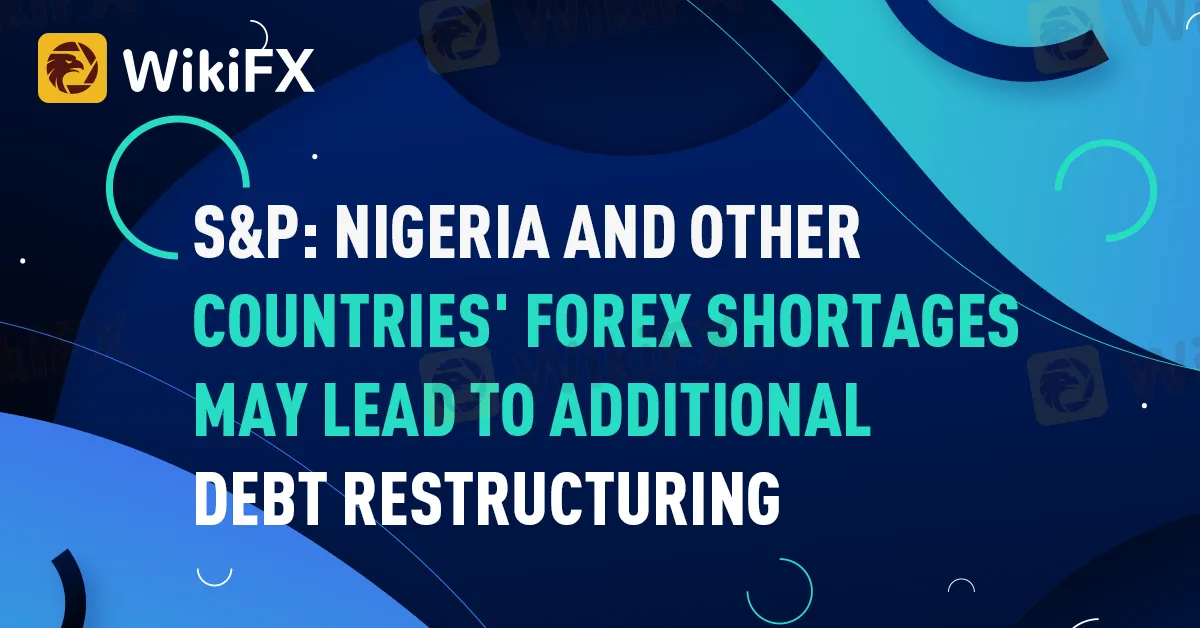简体中文
繁體中文
English
Pусский
日本語
ภาษาไทย
Tiếng Việt
Bahasa Indonesia
Español
हिन्दी
Filippiiniläinen
Français
Deutsch
Português
Türkçe
한국어
العربية
S&P: NIGERIA AND OTHER COUNTRIES' FOREX SHORTAGES MAY LEAD TO ADDITIONAL DEBT RESTRUCTURING
Abstract:According to S&P Global Market Intelligence, currency shortages in Africa continue to be under pressure from rising import prices and increased debt.

According to S&P Global Market Intelligence, currency shortages in Africa continue to be under pressure from rising import prices and increased debt.
Over the weekend, S&P claimed that problems with forex depletion were limiting the ability of African nations to pay back their debts, and it added that sub-Saharan Africa (SSA) were likely to seek debt restructuring as a result of potentially stricter capital controls.
According to the research organization, “SSA currencies stay weak against the US dollar over the second half of 2022, and pressure on terms of trade will only start to fade in early 2023.”
The Foreign Monetary Fund's (IMF) increased Special Drawings Right (SDR) allotment during August 2021, which was added to their official international reserves, was said to have helped all nations.
“We see that an expansion of current-account deficits will deteriorate SSA forex buffers in the near future,” the authors write. This is due to factors such a sharper-than-projected downturn in global economy and reduction of trade flows, high debt and a larger import cost.
The paper noted that Nigeria, the largest oil producer in SSA, fell short of strengthening its foreign reserve position in 2022.
It said, Any meaningful effort to relieve FX shortages will be hampered by political uncertainty given the forthcoming presidential election in February 2023.
It continued by saying that the outlook was affected by a number of variables, including changes in portfolio movement, modifications to foreign reserve balances, and inflation differentials.
The report stated that weaker currencies that may theoretically allow SSA economies' exports to gain market share and hence improve forex reserves have so far been overshadowed by a higher import bill as a result of high global oil and food costs.
It was said that there have recently been concerns about FX shortages due costs for currency suppliers and larger economic liquidity issues.
One of the main explanations was weaker growth in the eurozone, which is Mauritius's largest source of tourists.
S&P highlighted that weaker Foreign Direct Investment Inflows (FDI) have caused concern over adequate forex reserves in Kenya. The Kenyan government has implemented stronger capital controls to prevent the repatriation of foreign cash, even though the nation's central bank believes they are still at appropriate levels.
It emphasized that during the first two quarters of 2022, FDI inflows to Angola that were not related to oil fell to their lowest level since 2012.
Even if the trade balance has improved, the economy has been coping with a weakening in FX holdings, which has caused a change in the capital restrictions policy.
The decline in FX was mostly caused by increased debt service from mainland Chinese banks terminate as a result of rising oil prices. In comparison to December 2021, Angola's foreign debt to mainland China decreased by $350.8 million in the first quarter of 2022.
S&P noted that Ethiopia, which is renowned for its protracted low import coverage, continues to be at a high risk of not having enough external debt repayment capability due to its severely low levels affected by the military conflict in the country's north.
This would make it more difficult for Ethiopia to make future interest payments, such the $33 million Eurobond coupon payment due on December 11. It was stated that for Mozambique, there were signs that decreasing gas prices and budgetary slippage would raise the likelihood that the nation will require more debt restructuring starting in 2024.
The report noted that since interest rates have risen and the Eurobond markets have remained inaccessible, the likelihood that Ghana may restructure its debt has increased

Disclaimer:
The views in this article only represent the author's personal views, and do not constitute investment advice on this platform. This platform does not guarantee the accuracy, completeness and timeliness of the information in the article, and will not be liable for any loss caused by the use of or reliance on the information in the article.
Read more

RM570,000 Lost in a Gold Trading Scam in Malaysia
In a distressing case of financial deception, a retired female teacher in Malaysia lost RM570,000 of her personal savings and pension to a gold trading investment scheme.

Many Social Media 'Investment Gurus' Are Scammers Preying on Malaysian Traders
Social media platforms have become breeding grounds for scammers posing as investment gurus, exploiting the growing interest in forex and cryptocurrency trading among Malaysians. Fraudulent "financial experts" often create the illusion of legitimacy by offering enticing stock analyses and promises of high returns.

Arumpro Capital Ltd Faces Regulatory Setbacks as CySEC Withdraws CIF Licence
The Cyprus Securities and Exchange Commission (CySEC) has officially withdrawn the Cyprus Investment Firm (CIF) licence of Arumpro Capital Ltd. The decision was finalised during a CySEC meeting on 11 November 2024, marking another chapter in the firm's ongoing regulatory challenges.

Webull Expands Trading Services to Japan via TradingView
Webull launches in Japan, offering low-cost trading for U.S. and Japanese securities via TradingView. Start trading with investments as low as $5.
WikiFX Broker
Latest News
BSP Shuts Down Uno Forex Over Serious AML Violations
ACY Securities Expands Global Footprint with South Africa Acquisition
Tokyo Police Arrest 4 for Unregistered FX Trading Scheme
Rupee gains against Euro
WikiEXPO Global Expert Interview: The Future of Financial Regulation and Compliance
DFSA Warns of Fake Loan Approval Scam Using Its Logo
Consob Sounds Alarm: WhatsApp & Telegram Users Vulnerable to Investment Scams
CySEC Revokes UFX Broker Licence as Reliantco Halts Global Operations
GCash, Government to Launch GBonds for Easy Investments
Bitcoin ETF Options Get Closer to Reality with CFTC Clarification
Currency Calculator


